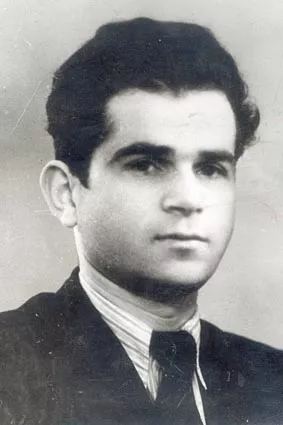Kofman Raikhchin
This photograph was taken in Leningrad when I was a student. Probably I wanted to send my photo (wearing my suit and new necktie) to my sister, therefore and addressed a professional photographer. Now I’ll tell you about my student life.
In May 1943 I left the hospital walking on crutches and having a certificate of disabled soldier and 2 government awards: Order of the Great Patriotic War (I Class) and a Medal for Military Merits.
I reached the kishlak in Samarkand area, where my sister lived. By that time my father was already dead. My sister (who worked as a bookkeeper from the beginning of the war) taught me accounting. I got fixed in a job at the office which was engaged in purchase of grain, and worked there quite successfully. We lived in that kishlak in a very interesting premise: a long wattle and daub house divided into compartments. Formerly (when in Uzbekistan polygamy was authorized) each compartment was intended for one of the wives of the harem. So we lived in one of those compartments till the end of the war. When the war was finished, we decided to return home (to Petrikov). In August 1945 we started our trip.
The town did not suffer severe destructions. Our house remained safe, but it was impossible to live in it: doorframes were taken out, floors were partly disassembled. We decided not to repair our house, but to sell it and to rent a smaller one: by that time our family was no more as large as it was before the war burst out. In the town there appeared Jewish families, but they were families which returned from evacuation. I already told you that fascists executed by shooting all Jews who remained in Petrikov. I started working as a bookkeeper. In the town there was a newspaper Stalinskaya Pravda. Rose Shusterman, a young lady and my schoolmate was an editor-in-chief. She helped me to become an employee at that newspaper. I worked in several places more as a part-time worker therefore I managed to earn for living.
In our town there were no anti-Semitic manifestations (neither before the war). Once I had to work as a teller before elections to the Supreme Soviet of the Soviet Union. I made speeches at different meetings and incited people to vote for the block of communists and at-large candidates (at that time they called it this way). My electoral district included an orthodox church. I went there and asked the priest to invite his parish to vote. He understood my request. Later he often visited me at home, especially when I was ill. In Petrikov people paid no attention to nationalities or religious traditions.
But I did not want to work as a bookkeeper all my life long. Therefore I decided to go to Leningrad to study. I wanted to study at the College for Cinema Engineers, but I got to know that they had no hostel for nonresident students. So I chose the Leningrad College for Fine Mechanics and Optics. [The Leningrad College for Fine Mechanics and Optics was founded in 1930.] I arrived in Leningrad and filed my documents. My certificate was full of excellent marks, therefore I was taken in without entrance examinations. I studied there for 6 years and showed interest in future profession. I had a lot of friends, but I never paid any attention to their nationality. So I cannot tell you, which of my friends was Russian and which one was Jewish. The same was during all my life. For example my close friend (we were friends since we were students of the 3rd course) was Russian. We made friends according to our interests: someone was at war (it was possible to talk to him about war); the other one was my fellow countryman, etc.












